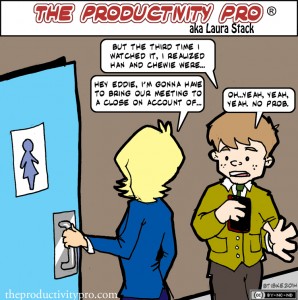“I wonder if you’ve got a minute.”
“I have many minutes, all of them used toward a common purpose.”
– Jodi Picoult, American novelist; quoted in Plain Truth.
Here is the roundup of activity from Laura Stack’s blog, columns, podcast, and other featured articles. Scroll down to read the complete roundup of productivity resources to help you create Maximum Results in Minimum Time.
This week on the Blog
Impromptu Meetings: Cutting Down on Drop-Ins and Got-a-Minutes
 There’s a statistic going around the business world that claims that something interrupts or distracts the average office worker every three minutes. Many people find their time nibbled away by otherwise well-meaning co-workers, who drop in unannounced at our cubicles or stop us in the hall to ask, “Got a minute?”
There’s a statistic going around the business world that claims that something interrupts or distracts the average office worker every three minutes. Many people find their time nibbled away by otherwise well-meaning co-workers, who drop in unannounced at our cubicles or stop us in the hall to ask, “Got a minute?”
Managers and executives learn how to handle this issue as a matter of course, even if it means being bluntly honest with their unexpected visitors. I’ve worked with leaders who had employees who routinely plopped down in the visitor’s chair for 20 or 30 minutes at a time and just started to complain about life, their jobs, and their coworkers.
One astute young manager politely told a complainer who visited daily, “Look, I enjoy working with you—but if you’re that unhappy, maybe you should find another job.” Her response opened her employee’s eyes to the reality of what he was doing, and he stopped wasting her time. A few weeks later, he left the company for greener pastures and left her with a lot more free time.
Handling Impromptu Meetings
Not all drop-ins or got-a-minutes are wastes of time like these. They’re as valid a way of communicating useful information as email or phone messages, with the added value of talking face-to-face, with all the social cues and subtext that allows. When you have the time for them or they actually help you with your job, impromptu meetings are definitely worthwhile. But when they wander too far afield or turn to gripe or excessively long, purely social sessions, nip them in the bud. Social interaction may be good for a team, but negativity hurts productivity, and you just can’t abide timewasters, especially when you’re on a deadline. And these days, who isn’t?
If you prefer to maintain an open-door policy with your team, include some rules to let them know when you can’t afford to spend time chatting. (<–Click to Tweet) For example, you might wear a special red hat, put on your earphones, or post a discreet sign noting your unavailability until a certain time. For those who can’t take a subtle hint, you can close your door if you have one, or tack string or tape across the opening to make your situation obvious.
Some people post hours when they’re unavailable for meetings—think of them as “reverse office hours”—or times they are available, such as office hours. Someone might still ambush you in the hallway no matter what you do, but if so, have the visitor walk with you, or remain standing and tell them you can only spare five minutes. If more is required, the person can send you a meeting invite. Standing meetings are almost always shorter than sitting ones, since they keep the conversation focused on the task.
If a visitor overstays their welcome, stand up. They may get the point. If not, and you don’t feel comfortable telling them you need to get back to work—or if they just ignore you—tell them you have a looming deadline or another meeting, and as politely as possible, usher them out of the cube or office. You can still talk as you walk, until you turn off for your other “meeting” or simply go into the bathroom (a good way to ditch members of the opposite gender!). After a short break, you can return, close the door (if possible), and get back to work.
A Moveable Feast
As much as we complain about them, face-to-face meetings remain the best way to truly communicate. We need some level of socialization to build relationships. When you’re in the same room with someone, you get all the expressions, body language, tones of voice, emotion, and similar cues that just don’t come through in other media. When communication is the intention, you can do it efficiently and quickly. But when someone pops in or stops you in the hall just to kill time or complain, it’s a timewaster. You can’t afford to let them steal your day. Find ways to kindly but firmly help your visitor go away; unless they’re oblivious, they’ll get the point and leave socializing for break time and lunch. You can’t afford to let others rob your productive time, or you’ll never get your own job done.
Special Bonuses Available Jan. 18-22 on my new book
Visit www.3TLeadership.com for details
 Doing the Right Things Right details precisely how today’s leaders and managers can obtain profitable, productive results by managing the intersection of two critical values: effectiveness and efficiency. Effectiveness, Stack says, is identifying and achieving the best objectives for your organization-doing the right things. Efficiency is accomplishing them with the least amount of time, effort, and cost-doing things right. If you’re not clear on both, you’re wasting your time.
Doing the Right Things Right details precisely how today’s leaders and managers can obtain profitable, productive results by managing the intersection of two critical values: effectiveness and efficiency. Effectiveness, Stack says, is identifying and achieving the best objectives for your organization-doing the right things. Efficiency is accomplishing them with the least amount of time, effort, and cost-doing things right. If you’re not clear on both, you’re wasting your time.
Don’t forget to sign up for the free webinar on January 19. Read More.
Podcast
Visit with me this week while I talk about making sure you are doing the right task for your energy level.
© 2015 Laura Stack. Laura Stack, MBA, CSP, CPAE is an award-winning keynote speaker, bestselling author, and noted authority on employee and team productivity. She is the president of The Productivity Pro, Inc., a company dedicated to helping leaders increase workplace performance in high-stress environments. Stack has authored seven books, including her newest work, Doing the Right Things Right: How the Effective Executive Spends Time (Jan. 2016). She is a past president of the National Speakers Association, and in 2015 was inducted into its exclusive Speaker Hall of Fame (with fewer than 175 members worldwide). Stack’s clients include Cisco Systems, Wal-Mart, and Bank of America, and she has been featured on the CBS Early Show and CNN, and in the New York Times. To have Laura Stack speak at your next event, call 303-471-7401 or visit her website.



Great points, Laura! For long, I’ve used the excuse ‘I have a call’, but I can see how – especially for executives – it’s better to just be upfront about it and set a precedence in the organization.